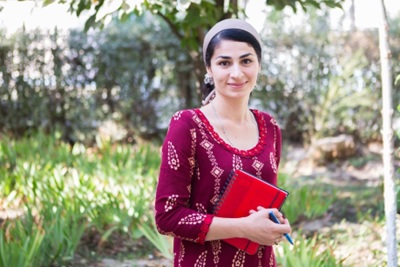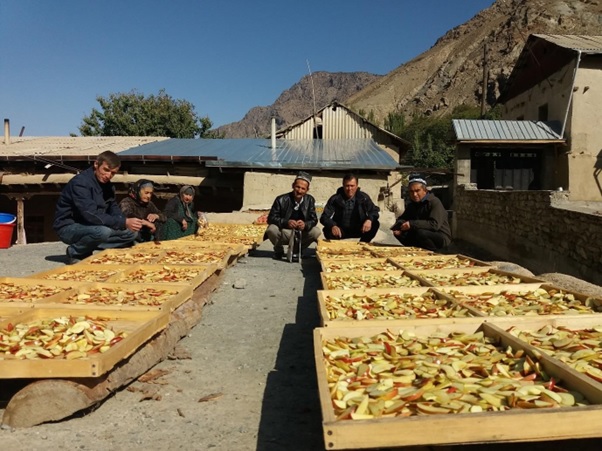
Aminah is a lawyer working with the League of Women Lawyers of Tajikistan (LWL). She is one of the 5 lawyers who works with Legal Clinics (LC) in Kulyob as part of Oxfam’s Gender, Enterprise and Markets (GEM) programme in Tajikistan. LCs offers a range of legal assistance to the rural population, especially poor women, such as legal counselling, petitioning and representing clients in court litigation. The LC operate from the local Jamoat office as part of an agreement between Oxfam and the regional authorities. ‘Being part of Jamoat office structure brings legitimacy to our activities and helps in building knowledge and awareness among the officials of the Jamoat on legal issues. Because of our three years of collaboration, we could mainstream legal support in the operations of Jamoat center’ says Zebo Sharifova, Executive Director of the LWL.
As a young lawyer hired by LWL to manage the LC, Aminah received trainings and capacity building support to help her sharpen and upgrade her skills. ‘After three years of rigorous training and practical exposure, today I can claim to be a specialist lawyer on family matters and on women’s land rights’ she said with a sense of confidence. With the support of Oxfam, LWL in collaboration with National university and Ministry of Justice conducted 12 training programs on women’s land rights for 150 young graduate lawyers. Building up a cadre of specially trained lawyers has helped in further deepening the outreach of legal support to the poor in the country who would otherwise lack access to legal services and representation.
Aminah’s LC office in the Jamoat is generally full of poor people waiting for assistance. In the lounge, a gallery of information materials ranging from posters, banners, hand-outs and brochures to the constitutional rights of women, including land rights, protection against domestic violence and so on, are prominently displayed. A quality assurance policy on the bulletin board also informs clients on quality standards for services and the contact details of authorities for grievance redressal. ‘The Clinic has really evolved over the past three years. Initially it took time for us to spread the word on services offered by the clinic. Women were at first reluctant to come to the clinic and discuss family issues. But now there is a distinct shift. Young women, often victims of domestic violence or facing hardship after separation, now come in increased numbers to consult with us,’ says Aminah.
Oxfam’s support to women Farmer Producer Groups also helped in women coming to the clinics in increasing numbers to settle land related legal issues. Zarkambi said ‘Earlier we were mostly tied to our homes and families. Oxfam started to mobilize us through PGs, helped build our skills and capability to do farming on our own land or land provided by CBOs. It’s a great feeling to be able to contribute to the livelihood of our family’. Aminah believes that, ‘while the demand for legal services was always there in rural areas, the real big jump in people coming to the LC happened 1.5 years ago. To expand the outreach of clinic, we started a large-scale campaign in villages all around the Jamoat holding sessions on women’s rights to land. We also conducted trainings for officials from the Hukumat and Jamoat on issues related to land rights to raise their awareness and knowledge. After the campaign, the number of clients approaching the LC almost trebled in 4 months. We also thought the LC should step out of the Jamoat office and reach out directly to the village community. The idea of mobile legal clinics came out of that. Today we do mobile LCs in different villages at least once per week’. LWL covered over 360 villages and trained 298 officials of local authorities as part of the campaign to spread awareness on legal land rights of women. LWL’s Zebo stated that ‘in the past three years our network of LCs has directly reached to over 8000 clients, has helped at least 4516 women to get land certificates, 1200 petitions were filed in the court and 2000 family matters were resolved’.
Looking back over her three-year journey, Aminah believes that a solid foundation has been established to strengthen women’s rights to land in Tajikistan, yet gender discrimination is so deeply entrenched that it will require even greater effort and more time to make significant, lasting, progress. ‘While there has been a steady rise in the number of women clients to my clinic, which is a positive development; we also see a disturbing trend in the rise of cases of domestic violence. I see two reasons for this spike: an increasing number of returning male migrants from Russia and women getting more assertive about claiming their rights and challenging traditional norms and attitudes in their families. Regressive attitudes in society need to change and this challenge continues to inspire me in my daily work.’

